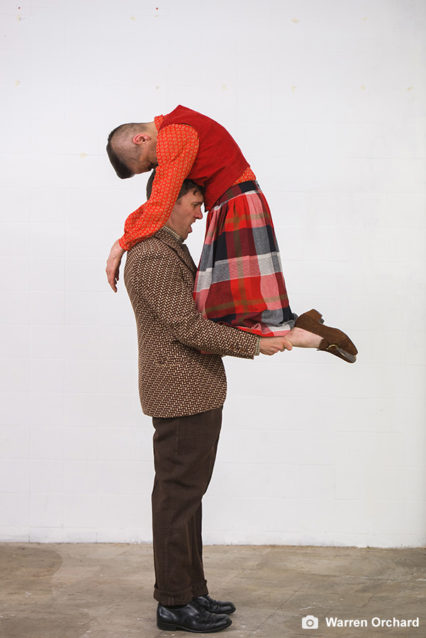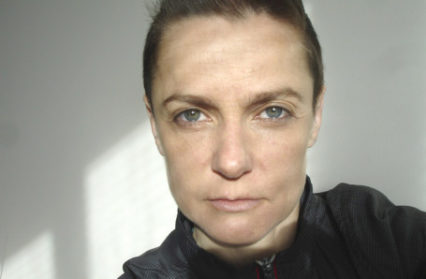Originally commissioned by the National Library of Wales as part of their centenary celebration of Dylan Thomas’ birth, Light, Ladd & Emberton’s dance production Caitlin has been taken to Kolkata as part of a season put on by British Council Wales and Wales Arts International. Here, Eddie Ladd chats to Gary Raymond about the difference in dance culture, collaborations and working with the Kolkata-based Pickle Factory Dance Foundation.
Gary Raymond: Firstly, what were you impressions of Kolkata? And, given the different traditions in dance and culture, how have people responded to your work?
Eddie Ladd: As a whole rather than an edited sequence and everything lives in a layer together. That’s been my impression, I’m aware that I know nothing, all you can do is try read the visuals. We did a tour one day and that’s when the specifics, you can see them then. You can’t just repeat what’s going on just by looking at it; things about certain people being certain places and the jobs they do and the areas that they go to. All those things were shown to us, where the East India Company had all its offices and warehouses, all these things were an eye opener, and then we did our work as well which, of course, we were really, really focused on and that’s what we wanted to do all the way along, people have been giving us everything that’s necessary.
Did you find that the level of focus was a bit different? Did you find that the general atmosphere had an effect on the performances and the workshops or was that all cast aside?
Yes, people did say it was a kind of theatre that they hadn’t seen or a kind of dance that wasn’t normal and I think that’s people who know contemporary dance as well, not just Kathak or the dance forms here.
It was unusual, I think. We did a fantastic workshop up in Bolpor and all the participants were young, students age 18-22 and none of them were what we call movers, they were print-makers, fine artists, or art historians and every single one turned out fantastic work. They didn’t seem to find the tasks a problem, their enthusiasm was huge, in application […] everything about it. That attitude was ideal, and sometimes we struggle to find that attitude in other places, in our own country, let’s say. The wholeheartedness of those students was amazing.
We had some school pupils in yesterday, they had watched the shown the day before. They were immaculate, I don’t know why I expected people in hoodies to not be sitting upright. It was a boy’s school, they all sat upright they all attended the performance and then they asked questions, which shows that they followed what was going on and they had questions about the show which had a level of discourse, which was very, very interesting to us. Their clear sightedness was quite novel.
Did you find that in terms of craft and practice that the students in the workshop were bringing a lot of their own ideas that were filtered through from their own culture and practice?
I don’t know as we were working with students that were not movers in Bolpur. Because the show contains a lot of natural movement, which is not shaped by contemporary dance in such a way, it has instructions like head is heavy. They accessed all of that very easily and they did it in the way that we like to do it in Caitlin. That style is in all of us, that style was no problem to them whatsoever. They study art so they were steeped in art practices and everything. It didn’t seem to be filtered in a way through something else. They recognised what it was.
Caitlin is one of the projects that is over here for #WalesinKolkata which has done some work outside of Kolkata, in Bolpur and Shantiniketan. Do you feel there’s any big differences between the work you’ve done in Kolkata and the work in Shantiniketan, which is the first place you went that was your first experience?
I don’t know, the level of attentiveness was the same. Deborah [Light] did a lecture and she took the workshop we’ve done here, I didn’t take that workshop as we had two shows that day and we were supposed to rest and save it. The level of attentiveness and application was the same. The lecture was in a university which is far more politically active. Siôn [Orgon] said it was a bit like going to one of the universities not in Cardiff, I can’t remember what he said, there was graffiti everywhere and everyone was obviously very clued up on politics, so that was a different atmosphere to yesterday – definitely. The application, attentiveness and awareness seem to be very sharp everywhere.
 You said you had been working with a lot of students that study art or come from a cultural, literary background. Was there much knowledge of Dylan Thomas or the story?
You said you had been working with a lot of students that study art or come from a cultural, literary background. Was there much knowledge of Dylan Thomas or the story?
There wasn’t much knowledge about Dylan or Caitlin Thomas. Some people did know a little bit, had maybe read a poem, some of the adults were very well clued up but not everyone in an audience would know either. Very often in a workshop we would give some good background and then go into the tasks. The knowledge of Dylan Thomas was not huge, and the show is about Caitlin Thomas and we had to explain the relationship of her lack of fame and his great fame. We did that so they could see why the show had the tone that it does as well.
Did you find that there was any different feeling, because obviously if you did this show in Wales or anywhere in UK or Europe people turn up with preconceptions about Dylan Thomas and his relationship with Caitlin. Did you go into anything a little bit differently, even if it was just psychologically?
No, we didn’t as we have to go into our own psychology for it, we go through that every time we do Caitlin, the fear of the start, that awful five minutes working through all the psychology patterns that we normally do. Your body has to gear up for it, think of the task. We went through our own normal process with it. We weren’t in a bubble, as you never are with Caitlin. But we had to look after what we were doing very carefully as we normally do, look after your own craft.
How has it been working with Pickle Factory?
Absolutely fantastic. Everything they’ve done honestly, they’ve organised everything. They’ve had respect for the work, and we’ve made friends with them, it makes you want to support them in the future. They’ve been amazing.
Do you see future collaborations coming out of this?
We’d love to go back to Bolpur, we’ve spoken about it already. You’re always enthusiastic after a workshop and then the rest of it is harder to organise. But we would love to go back there, there’s a couple of projects we can offer, and they can offer back. It would be a very good thing to do. It’s not a tour as such, when you visit places you can make a relationship with someone as we’ve done so many activities that were not the show.
You touched on earlier that you, as an individual but also as a group of creatives and artists, have learnt a lot on the trip. The question sounds like a bit of a cliche when anyone comes to India. But is there anything you’ve seen or felt that is working its way into the way you think about the craft, or even the practice of workshopping?
Not yet, I don’t think we’ve touched enough on what our hosts do, for that to come into our own work yet. You don’t think the only measure of success is if it sparks off something in you. Were going to see a show tonight, which will be the first show we’ll see. We’re looking forward to seeing that, which’ll be an eye opener. I’ve heard this before with people that tour, and the British Council said this to us, “we’re always sending people out to different countries” and very often people ask “when can we come to your country then?”. So its not necessarily about what creativity is sparked off in us that’s important, but how our hosts have interpreted our work.
So apart from seeing this show tonight, what else have you got planned before you go back home?
The show that we’re seeing tonight is the last thing we do. But getting the opportunity to see what local people do is fantastic and it’s going to be a great send off.
Caitlin is part of Wales in Kolkata, a season of Welsh arts activity and collaboration taking place in Kolkata this January. Supported by Wales Arts International and the British Council, Wales in Kolkata is a result of the relationships and networks formed by the 2017/18 #IndiaWales season, a major programme of artistic collaboration between Wales and India.
















